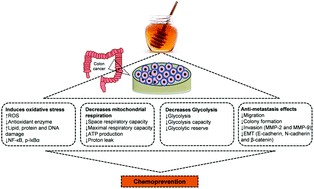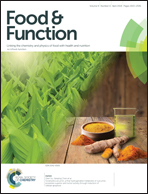The inhibitory effect of Manuka honey on human colon cancer HCT-116 and LoVo cell growth. Part 2: Induction of oxidative stress, alteration of mitochondrial respiration and glycolysis, and suppression of metastatic ability
Abstract
Despite its high content of phenolic compounds, the chemopreventive activity of Manuka honey (MH) is still elusive. The aim of the present work was to evaluate the effects of MH on oxidative stress, antioxidant enzymes, cellular metabolism and the metastatic ability in HCT-116 and LoVo cells, paying particular attention to the molecular mechanisms involved. We observed a strong induction of oxidative stress after MH treatment since it augmented the accumulation of reactive oxygen species and increased the damage to proteins, lipids and DNA. Furthermore, MH suppressed the Nrf2-dependent antioxidant enzyme expression (superoxide dismutase (SOD), catalase and heme oxygenase-1) and the activity of SOD, catalase, glutathione peroxidase and glutathione reductase. Cell metabolisms were markedly disrupted after MH treatment. It decreased maximal oxygen consumption and spare respiratory capacity, which could reduce the mitochondrial function that is correlated with cell survival potential. Simultaneously, MH decreased the extracellular acidification rate (glycolysis) of HCT-116 and LoVo cells. Furthermore, MH suppressed the p-AMPK/AMPK, PGC1α and SIRT1 activation, involved in the survival of HCT-116 and LoVo cells under metabolic stress conditions. Dose-dependently, MH reduced the migration and invasion (MMP-2 and MMP-9) ability, and concurrently regulated EMT-related markers (E cadherin, N cadherin, and β-catenin) in both cell types. The above findings indicate that MH induces HCT-116 and LoVo cell death partly by enhancing oxidative stress, as well as by regulating the energy metabolism in both aerobic and anaerobic pathways and suppressing the metastatic ability.



 Please wait while we load your content...
Please wait while we load your content...